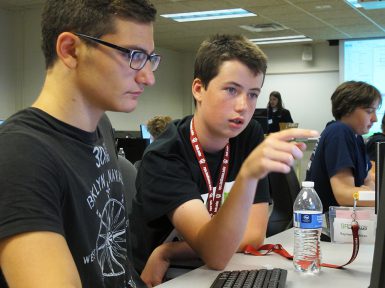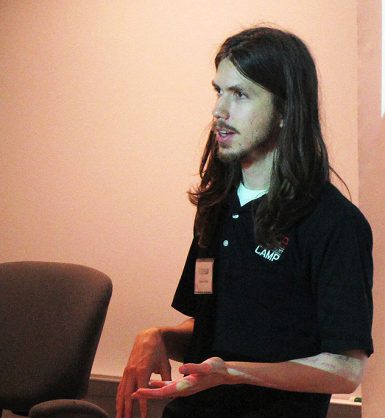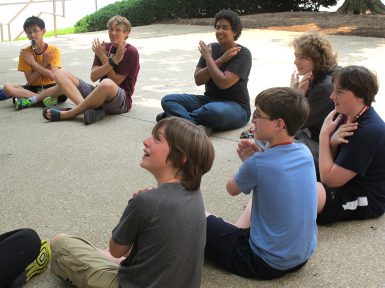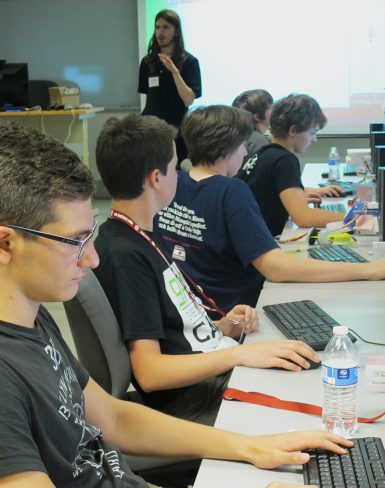Teens at Game Camp developing their own 2D, 3D games

During the month of July, the third annual IU Game Development Camp is welcoming gamers ages 13 and up to campus, with the goal of teaching them to develop and create their own video games.
The camp, first conducted in 2013 as a one-week day camp, has grown by leaps and bounds, said Chabane Maidi, director and instructor of the camp. He and associate professor Ted Castronova developed the idea, secured approvals and marketed the first camp in less than five months, and enrollment that year was at capacity.
“We knew that it would take off right away,” Maidi said.
Game Development Camp June 29- July 24, 2015
Game campers sit at computers in a lab.
Cabana Maidi, Game Lab manager
The vision behind the camp was that students in Bloomington were going to be capable of picking up game development so well that they could come in with no prior experience with game development and be able to design their own game and create that game in one week, so that was that was my ambition.
Edward Castronova, Director of game design
So what students will learn when they come to a camp like this is, first and foremost, how very difficult it is to make a video game. Most of the time when you play a game you don’t realize how hard it is to actually make them, so what we have done is let almost any student open up what a real game engine looks like and to understand the kind of logic flows that are behind that sort of a system. And we’ve chosen some software that’s really easy to use right, and so that allows even somebody who knows nothing about computers can just walk in and very quickly at least have something going on on the screen.
Students manipulate the software and show their games on the screen.
I was just blown away by what the students were capable of doing. They exceeded any of my hopes and expectations. They’re just astonishing, what they were able to complete in a single week.
Produced by Xander Harty Music “Fortsetzung Folgt” by Gumbel, freemusicarchive.org
This year, the camp is divided into four week-long sessions and for the first time features an overnight package at Teter Residence Hall. Two sessions are repeated: two-dimensional game development is offered the first two weeks, three-dimensional game development the third and fourth weeks. Some students opt to attend one of each.

Maidi attributed the growth of the camp not only to the popularity of the subject matter, but also to the ambition of the students attending the camp.
“The first year, we offered only 2D development, because I wanted the campers to come in with no prior instruction and leave with a finished product,” he said. “After the first week, I was absolutely blown away, and it became apparent the kids could handle 3D.”
The games created by students in years past have been published online, some receiving more than 100 views in a matter of days, according to Maidi.
While students learn the basics of logic scripting, programming, game design and development, the counselors and instructors said they try to impress other valuable life lessons on the campers during their stay.
Sophomore Mandy Reed, a passionate gamer studying social work, is a counselor at this year’s camp. Reed said she tries to use her experience working with children with social issues to help encourage interaction among the campers.
“It seems to be a trend that gamers can be somewhat socially awkward,” she said. “I’m trying to come up with icebreakers and activities to help them engage with each other without the technology. Technology is great, but human interaction is even better.”

Another important issue instruction focuses on is diversity and inclusion in the gaming industry. Staff members agreed that the narrow definition of “gamer” can often exclude women and people of color, and they are hoping to change that.
“We are really trying to break down the assumptions the kids have about genres, users and developers,” said Maidi. “We are going to play a lot of games that are outside the mold, and one of the guest speakers is a woman who has won awards for her indie game development.”
As students are exposed to these issues and sample several different facets of game development, they are able to identify the aspect that appeals to them the most and home in on that skill. Twelve-year-old camp attendee Tony Yu said he’s uncovered a passion for programming.
“I really like working with the individual elements of the game and picking through the pieces,” said Yu. “It can be boring sometimes, but taking on the responsibility and finishing is a lot cooler with programming.”

In addition to finding their niche in the game development process, students experience what it is like to be a student on IU’s campus. Thirteen-year-old Spencer Walsh said even thought he is a Bloomington native, he had spent little time on campus before attending the camp.
“It’s cool because I can imagine this is what it’s like to take classes at IU,” Walsh said. “We are in the same learning environment using IU computers in an IU classroom.”
Walsh said that exposure to IU and game development has furthered his interests in pursuing a game design degree from The Media School at IU. The Indiana Commission for Higher Education approved IU’s Bachelor of Science in game design in June, and curriculum will go effect this fall.
Maidi, who will oversee the game lab at The Media School when it moves to its new home in Franklin Hall, said he hopes that as the IU game design program grows, the game development camp will do the same. The program will produce more IU students versed in the creation and development of video games, which potentially will provide the camp with additional staff. This expansion of staff is what the camp needs to accommodate the growth in student campers, he said.
Another prospect for the future of the camp is networking with IU game design alumni. Maidi noted that as IU students graduate from the program and enter the industry, they will become valuable resources for the camp as guest speakers, professional connections and supporters.
“The camp is completely self sufficient,” said Maidi. “All of our funds come from enrollment fees. With the addition of even one donor, we would be able to offer a few campers scholarships and further our mission of inclusion and diversity in gaming.”

